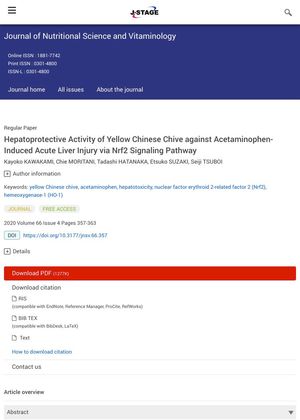Hepatoprotective Activity of Yellow Chinese Chive Against Acetaminophen-Induced Acute Liver Injury via Nrf2 Signaling Pathway
August 2020
in “
Journal of Nutritional Science and Vitaminology
”

TLDR Yellow Chinese chive extract helps protect mouse livers from damage caused by acetaminophen by activating an antioxidant pathway.
Three years ago, a study was conducted to investigate the hepatoprotective effects of yellow Chinese chive extract (YCE) against acetaminophen (APAP)-induced liver toxicity in mice. The study found that pretreatment with YCE significantly prevented the increase in serum levels of liver injury markers such as alanine aminotransferase, aspartate aminotransferase, lactate dehydrogenase, and alkaline phosphatase, which were elevated due to APAP treatment. YCE also prevented APAP-induced centrilobular necrosis in the livers of the mice. Although YCE dose-dependently elevated glutathione levels, the difference was not significant. The study also found that YCE increased the expression of Nuclear factor erythroid 2-related factor 2 (Nrf2) and its target antioxidant enzymes, especially hemeoxygenase-1 (HO-1), suggesting that YCE could induce HO-1 expression via activation of the Nrf2 antioxidant pathway, and protect against APAP-induced hepatotoxicity in mice.



